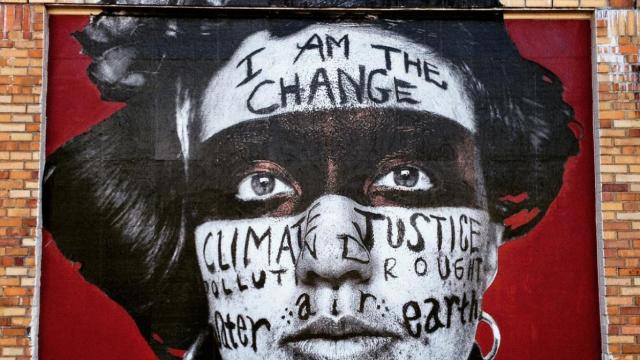
In this ongoing series “From the Ground Up,” Occupy.com joins with Commonomics USA in presenting stories of local struggles for a new, sustainable economy.
Conventional wisdom holds that climate policy is international in scope and national in implementation. But big money has colonized national politics in the United States, gerrymandering has created a Congress unreflective of the will of the people, and the widespread economic insecurity associated with the transition away from fossil fuels feeds climate change denial and fear-mongering from the Beltway’s most powerful politicians. We need economically just means of healing our planet.
Enter states and municipalities. When I talked to Duncan Clauson of Carbon Washington last week about Washington State’s historic Initiative 732, which would institute a carbon tax and a monetary rebate directed to poor working families, he gave a simple reason for pursuing state and local measures on climate change. “The pathway to winning and structure of policies are going to vary widely,” he told me, “but the federal government has really struggled to take action.” State and local governments, he said, “have an opportunity to move faster, and to experiment.”
They also can move more easily under the radar of fossil fuel lobbyists and climate skeptics – although the American Legislative Exchange Council (ALEC) is trying its best to undo local ecological consciousness, getting states to ban municipalities’ attempts to implement more sustainable economies. But because state and local governments are closer to their constituents’ day-to-day lives, they have their fingers on the pulse of the material and cultural processes occurring around them.
Here are six ballot initiatives to watch in the 2016 elections. These measures are noteworthy because they don’t just regulate emissions or mandate transitions. They actually do things like help the economically insecure, create material incentives for individual change, restore ecosystems, and reassert the authority of local entities over corporate polluters. They are concerned with democracy as much as with the environment, and so they deserve the support of activists who know that the transition to a sustainable economy needs to come from the grassroots rather than waiting for the beneficence of the elites.
1. Washington: Reducing Carbon Emissions While Helping the Poor
At the top of the list is the first and only carbon tax and rebate initiative in the United States, an idea championed by a variety of advocates across a wide ideological spectrum. Over a two-year period, Initiative 732 would institute a $25 per metric ton of CO2 consumed in the state. The proposal also reduces state sales taxes across the board by 1 percent; this makes sense because sales taxes are regressive for no socially defensible reason, while the carbon tax at least has a purpose. Even better, the proposal provides up to $1,500 per year in the form of a tax rebate to 400,000 of the lowest-income Washingtonians – the people most likely to fear a post-carbon transition for legitimate economic reasons. While it’s not the kind of full-scale transition support we need to ensure that climate justice includes economic justice, it’s miles ahead of the rest of the country. “Making sure a significant enough portion is set aside to address vulnerable populations and poor people is critical,” says Clauson, who co-directs Carbon Washington with Kyle Murphy, “and hopefully those same communities will reap the benefits of clean air and health.”
2. Florida: Solar Power for the People
There are two solar power initiatives on the ballot this year in Florida, both proposed as amendments to the state constitution. One is serious and progressive; the other is a dirty lie. This article lauds the good one, but will also mention the bad one. Amendment 4 provides tax exemptions for solar power and other renewable energy equipment included in home values for property taxes. “Tangible personal property taxes” are the most burdensome of property taxes for homeowners, and Amendment 4 would exempt them for 20 years in order to purchase alternative energy mechanisms.
But the other Florida ballot measure, Amendment 1, is a deceptive giveaway to big fossil fuel-burning power companies. It surreptitiously prohibits “subsidies” for solar customers, which could mean no tax incentives at all. And while supporters claim that Amendment 1 “allows” consumers to lease their own solar mechanisms, consumers in Florida already have that right. Instead, critics say, the new law would allow utility companies to charge solar users more than fossil fuel users – even up to twice as much, according to a legal brief filed by the group Earthjustice. Groups with ties to the Koch brothers are funding the campaign for Amendment 1. Its supporters include a who’s who of big carbon: Florida Power & Light, Duke Energy, Gulf Power and Tampa Electric Company have given at least $160,000 each to the campaign. When considering sustainable energy policy, it’s important to read the fine print.
3, 4 and 5. The Municipal Pushback Against Fracking Bans
The California counties of Butte and Monterey, and the city of Columbus, Ohio, tie for the third, fourth and fifth spots on this list for their courageous effort to give local citizens control over the environmentally disastrous practice of fracking. These regions have answered ALEC-engineered efforts to “ban the banning” of fracking – challenging state laws that have complicated efforts at local control and stripped both regulatory and bargaining power from cities and towns.
The localities aren’t alone. After the Colorado Supreme Court struck down local fracking bans in that state, communities are pushing backthere, too. Showing even more audacity, Grant Township in Western Pennsylvania recently passed a law protecting residents from arrest if they protest Pennsylvania General Energy Company’s creation of an injection well for fracking.
6. San Francisco Bay Area: A Dollar a Month to Preserve the Planet
Rounding out our list, communities in the San Francisco Bay Area are trying to collectivize the cost of wetlands restoration and water quality control, while pushing back against both privatization and pollution. Measure AA would implement a tax of literally $12 per year throughout the Bay Area – a dollar per person per month – and use that money to restore wetlands, reduce trash, clean out toxins in the water, expand the habitat for fish and wildlife, and increase public access to shoreline parks and recreation. The initiative also aims to protect vulnerable communities in the Bay Area like Richmond, Marin City, Hayward and East Palo Alto from sea level rise. It’s the ultimate socialization of cost – the kind of egalitarian scaling communities can implement regardless of what big government in Washington D.C. or Sacramento does. As the California Audubon Society points out, over “$60 billion in homes, businesses, and crucial infrastructure is at risk” from rising waters in the area. No wonder AA enjoys the support of virtually every stakeholder organization in Northern California.
Matt Stannard is policy director at Commonomics USA and a member of the board of the Public Banking Institute.
If you liked what you read and want to see more original reporting on Occupy.com, donate today!
3 WAYS TO SHOW YOUR SUPPORT
- Log in to post comments














